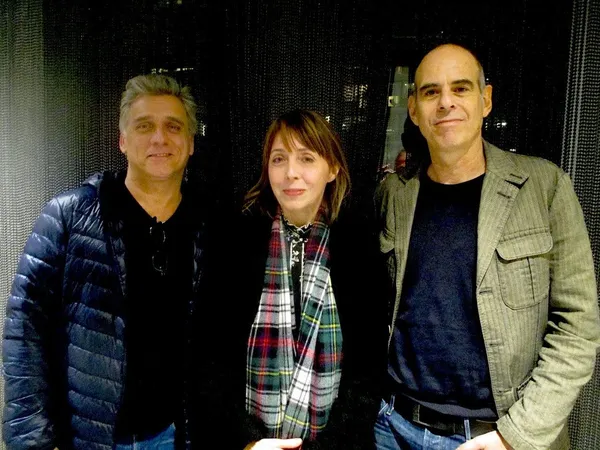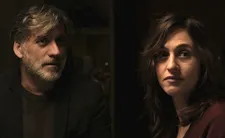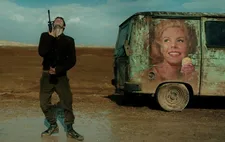 |
| Foxtrot star Lior Ashkenazi with his director Samuel Maoz and Anne-Katrin Titze at Sony Pictures Classics Photo: Gary Springer |
Foxtrot, Israel's Oscar submission, directed by Samuel Maoz, stars Lior Ashkenazi (terrific in Joseph Cedar's Norman: The Moderate Rise And Tragic Fall Of A New York Fixer opposite Richard Gere), Sarah Adler (Sofia Coppola's Marie Antoinette) and Yonaton Shiray (Natalie Portman's A Tale Of Love And Darkness).
Maoz, whose last film Lebanon won the Golden Lion at the Venice Film Festival, teams up again with cinematographer Giora Bejach to produce an emotionally charged drama of man-made destiny. It begins with every parent's worst nightmare. Lior told me earlier that in Israel audiences knew from the first second what kind of news the military officers were bearing to the Feldmann family.
 |
| Michael Feldmann (Lior Ashkenazi) with his wife Dafna (Sarah Adler) |
It might take international audiences a moment longer before realising that we see a mother fainting because she knows that they are here to inform her that their son Jonathan (Yonaton Shiray), doing military service, had fallen. The mother, Dafna (Sarah Adler) is given morphine to make her sleep, as we get to follow the father Michael's (Lior Ashkenazi) response to the devastating news.
He descends into a private and national hell with fine subtleties of suffering and broad kicks of sadism. It is a marvelous, wickedly truthful performance because it balances so many emotions. Maoz and Ashkenazi let us feel the vast gaping void that opens up when a beloved person dies.
Anne-Katrin Titze: Parents destroy their hands in your film. Because they cannot handle the situation anymore?
Samuel Maoz: And also to mark.
Lior Ashkenazi: Like Cain and Abel.
AKT: Cain and Abel?
SM: But it's on the hand. Somehow, when you put it here [he points to his forehead], it's not in front of you. But if you put it here [he points to his hand], you can see it. Everybody can see. If I ask you if you want a third eye, in the end it's the best way to put a third eye there.
_x1HqH9x_225.webp) |
| Samuel Maoz on Lior Ashkenazi in Foxtrot: "The actor does not know when the cut will begin ..." |
AKT: If it were on the forehead it would be for others but on the hand it is for themselves as well?
LA: They can see it actually.
AKT: As a mark.
SM: When they touch each other they will always touch this mark.
AKT: During that scene, [when Michael burns his hand with hot water] Lior, your face turns purple at that moment. Tell me a little about your technique. How did you get his face to turn purple? It's an immensely powerful scene.
SM (smiling): Not by adding more purple.
LA: I don't know. It's not about acting. I didn't feel like I'm acting because the way Samuel directs - it's not like the classic director. The classic director says "Action," you go on, do the take, "Cut," you speak about what just happened, and then you go and try it again. He [Maoz] starts with an action and it ends after 27 minutes when the memory card is finished in the camera.
Meanwhile, if there's no dialogue, he speaks to the actor. He speaks, actually speaks. In the scene in the bathroom [the purple face, hand marking scene] he speaks, if you raised the volume you could hear him. "It's your fault. Your son is dead. You can't even cry. You can't even feel anything. You should be ashamed of yourself." That kind of stuff.
 |
| Jonathan Feldmann (Yonaton Shiray) in Foxtrot |
AKT: So you are talking to him as the character? You don't say things such as "Now lift your arm"?
SM: No. I don't turn the camera between the takes. I just do first position and do another take and during the shot I address the actor and tell him what he is going to do and what he feels and I do it very personally. In the character context, of course. So somehow I turn the shot into a session.
The actor does not know when the cut will begin and he does not care anymore because when he goes through a difficulty, physical or mental, even extreme difficulty, at some point you get to the stage where you are just there and live the moment. You can imagine a kind of actor mission like Lior had.
Usually actors, they have one scene maybe one shooting day. But imagine 10 shooting days from 7 in the morning to 7 in the evening. "Good morning, Lior! Your son is dying." He has died for one, two hours. And I want to believe him in every movement! I want to believe his body language, his eyes, you know. Also the audience becomes very sensitive. A small fake can fuck everything.
AKT: Completely, throw us out, yes.
SM: So you need to … This is not something you can only act. Somehow it's to squeeze your soul.
AKT: To become at a certain point almost an automaton also?
_225.webp) |
| Lior Ashkenazi: "Samuel had a beautiful metaphor at the beginning. He told me 'I want to see you drinking and crying.' Water gets in and gets out." |
SM: I believe if you can create inside yourself real emotions, even if they are not exactly the same emotions, it will come naturally. It will come out in your eyes, in your body language. Like in life, you know, when you are traumatised, even someone that doesn't know you well can tell that you are disturbed. People see, people feel it. It's beyond talking, it's beyond words. I treat the text as an enemy. I tell myself if I can solve it without words it's better.
AKT: You treat your text as an enemy - yes. It's twenty minutes before you [to Lior] talk. The sensing that it's real includes the dog, Lumpi, as he is called in the end credits. The two of them have such a beautiful bond. Lumpi notices that what Lior does feels real. The dog feels what you are feeling.
I've rarely seen better communication shown in a film between an animal and an actor. That's why it is so shocking what happens on the fictional level, the kick, that we don't see. The dog says with his eyes - What's wrong with you? Can I come and help?
Let's get to another point - the water. The fact that you have to drink every hour. To put a rhythm onto somebody who is breaking apart, whose life is falling apart, who has no structure. Is that in an actual manual or was it your invention?
SM: I don't know exactly what they do but I felt that somehow they need to treat you like doctors. When you are a doctor you can't suffer for any patient. They need to create a kind of routine for you. You need to do this and that. I felt it will give some kind of metronome to the sequence itself.
 |
| Sunset at Sony Pictures Classics in New York Photo: Anne-Katrin Titze |
AKT: And it connects. Water becomes important in the other two parts. The rain, the soaking.
LA: Samuel had a beautiful metaphor at the beginning. He told me "I want to see you drinking and crying." Water gets in and gets out. But, I mean, it's impossible to do that.
AKT: And you're not crying.
SM: No, it wasn't to cry. We talked that someone who loses his son - we discussed how to act it and we said, let's take a basic thing like drinking a glass of water. And if you will know how to drink a glass of water like someone who lost his son you got it.
AKT: We get a God's perspective at points, from above - but shaky. I have never noticed that elsewhere. Of course there is the Hitchcock, Psycho perspective we know. But when the God's perspective is shaky - I think that fits very well with what you are describing overall in this film about destiny.
SM: Maybe because for me the conclusion of the film is that fate cannot be changed. Not because it's divine, but because of the nature of the traumatic Israeli men and women who shape the nature of the collective that is stuck in its trauma.
Foxtrot will screen for a one week Oscar run in New York and L.A. starting on December 8 before its official US theatrical release on March 2, 2018.
The 90th Academy Awards Best Foreign Language Film shortlist of nine will be announced later this year.
The nominations for the 90th Academy Awards will be known on January 23, 2018.
The Academy of Motion Picture Arts and Sciences celebration takes place on March 4, 2018.





















